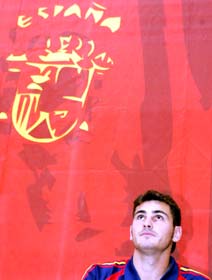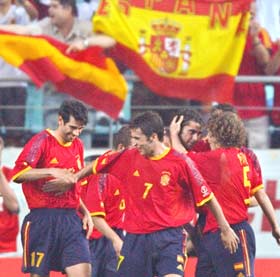|
|
| Help | |
| You are here: Rediff Home » India » Sports » Football Fiesta »
Reuters >
Report |
|
| |||||||||||||||||||||||||||||
| Spain searching for national identity |
| ||||||||||||||||||||||||||||
|
| ||
Spain is a country obsessed with soccer known as "el deporte rey" or the king of sports.
 Four of the best-selling daily papers are dedicated almost exclusively to the sport, it dominates the television schedules and provides the leading topic of conversation in every bar from Bilbao to Barcelona.
Four of the best-selling daily papers are dedicated almost exclusively to the sport, it dominates the television schedules and provides the leading topic of conversation in every bar from Bilbao to Barcelona.
Yet despite the almost insatiable appetite for the game, the Spain side has never been able to inspire the sort of excitement, emotion and loyalty that national teams enjoy in other countries.
In England [Images], Brazil [Images] and Argentina life comes to a virtual standstill during the World Cup, in Spain it continues pretty much as normal.
A game involving "la seleccion" generates only a fraction of the interest of the twice yearly "clasico" between Real Madrid [Images] and Barcelona.
So why are the Spanish unmoved by their national team?
Part of the explanation is to be found in the powerful regional divisions within the country.
Many of its inhabitants see themselves as Basque or Catalan or even Galician rather than Spanish and practically every region has its own representative team that plays at least one international friendly a year.
When Catalunya play, the Nou Camp is filled to the brim in an emotive display of nationalist sentiment and it is the same when the Basque select are on display at San Mames.
But the Spanish national team has not dared play at the Barcelona stadium since 1987 and last visited the Basque country 20 years before that. It would simply be too much like playing an away match.
POLITICAL BAGGAGE
 It is hard to imagine another country where a debate could occur about whether or not a footballer might want to play for the national team because of his political views, but that is the case with Barca defender Oleguer, a self-professed Catalan nationalist.
It is hard to imagine another country where a debate could occur about whether or not a footballer might want to play for the national team because of his political views, but that is the case with Barca defender Oleguer, a self-professed Catalan nationalist.
The Spanish flag carries so much political baggage with it that Chelsea's Basque defender Asier del Horno was reported to be concerned about being photographed next to it when he won his first call-up for the national side.
It is perhaps a blessing in disguise that the present Spanish national anthem has no words as singing it would be fraught with danger for some players.
"Because there is no consensus over the nature of the Spanish state, there is no consensus over the national team," says El Pais sports correspondent Diego Torres.
"Spanish players are not as proud as other national team players when they pull on the national shirt and that pride is a fundamental ingredient in the success of any national side."
Regional divisions are inextricably linked to the unchallenged supremacy of club over country in Spain with both Barca and Real drawing far more interest than the national team,
"In all countries there are strong clubs, but here the clubs also represent powerful political interests and that is the key," says Torres.
"Barca, for example, is more than a club, it represents Catalan identity. This sometimes prevents players from integrating fully into the national side.
"In other countries players belong to clubs, but not to a region or a way of life as many do here. It is very difficult to confront this matter, however, as it is a taboo in Spain."
MEDIA OBSESSION
 The media obsession with the big two sides means that whenever the national team gives a news conference questions are about club matters rather than the international clash.
The media obsession with the big two sides means that whenever the national team gives a news conference questions are about club matters rather than the international clash.
There is uproar whenever a Spain game takes place in the same week as the two teams meet as it disrupts preparations for "el clasico".
The announcement of the Spain squad rarely makes the front pages of the sports press and even during the World Cup, speculation about future signings will often take precedence over the national team's fortunes.
But regional divisions alone do not explain everything. Failure on the international stage is the other key ingredient that has prevented the national team from inspiring real enthusiasm from amongst the country's football fans.
Victory in the 1964 European Championship and a runners-up spot in the same tournament 20 years later are the country's only two significant achievements, while they have not got past the quarter-finals of the World Cup since 1950.
A string of disappointments have eroded loyalty to the national side.
Fans and commentators talk of a quarter-final jinx and have even tried to find comfort in conspiracy theories in a bid to explain why one of the traditional powerhouses of European football has failed to make its mark at an international tournament.
Triumph at the World Cup would almost certainly break the shackles that have restricted the national side for so long.
"Success could be the catalyst for change," says Torres. "If Spain achieves something important it will infect the people and help create an identity for the national team. It will also affect the clubs as say it did in France [Images] or Italy [Images].
"Spain and Italy are similar in many ways, but in Italy the success of the national team has made it a unifying factor, in Spain its failure has helped maintain the divisions."
| © Copyright 2006 Reuters Limited. All rights reserved. Republication or redistribution of Reuters content, including by framing or similar means, is expressly prohibited without the prior written consent of Reuters. Reuters shall not be liable for any errors or delays in the content, or for any actions taken in reliance thereon. |
|
|
| © 2006 Rediff.com India Limited. All Rights Reserved. Disclaimer | Feedback |